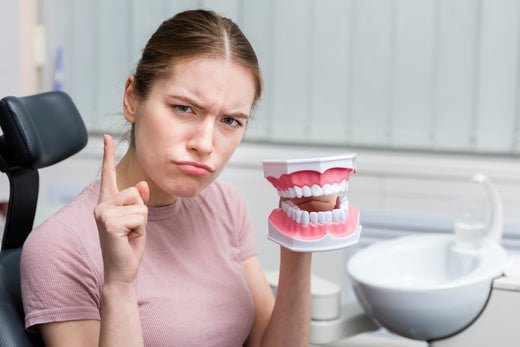Understanding Gum Recession: Causes, Symptoms, and Impact on Oral Health

Understanding Gum Recession: Causes, Symptoms, and Impact on Oral Health - Enzim Singapore
Gum recession is a common yet often overlooked oral health condition that affects millions of people worldwide. It occurs when the gum tissue that surrounds the teeth pulls back or wears away, exposing more of the tooth or even its root. While gum recession can be subtle in its early stages, understanding its causes, signs, symptoms, and the potential impact it has on overall oral health is essential for prevention and early intervention.
What Causes Gum Recession?
Gum recession can occur for various reasons, often resulting from a combination of factors. Some of the most common causes include:
-
Periodontal Disease: The most common cause of gum recession is periodontal (gum) disease. Bacterial plaque buildup on the teeth can irritate the gums, leading to infection and inflammation. If untreated, the infection can damage the gum tissue and bone, causing the gums to recede.
- Brushing Too Hard: Vigorous or aggressive brushing with a hard-bristled toothbrush can wear down the enamel and irritate the gum line. Over time, this repeated trauma can cause the gums to pull away from the teeth.
- Genetics: Some people are genetically predisposed to thinner or weaker gums, which can make them more susceptible to gum recession. If gum recession runs in your family, you may be at higher risk.
- Hormonal Changes: Hormonal fluctuations due to pregnancy, menopause, or puberty can make gums more sensitive and prone to recession. The increased levels of certain hormones can affect the gum tissue's health and lead to inflammation.
- Tobacco Use: Smoking or chewing tobacco can increase the risk of gum recession by impairing blood flow to the gums and promoting plaque buildup. This can weaken gum tissue and lead to receding gums.
- Misaligned Teeth or Malocclusion: Crooked teeth or a misaligned bite can put excess pressure on specific areas of the gums, which can cause the gums to recede over time. Teeth that overlap or crowd together can create areas where plaque accumulates, further contributing to gum problems.
- Teeth Grinding and Jaw Clenching: These habits can put excessive force on the teeth and gums, leading to gum recession. The pressure from grinding or clenching can cause the gums to recede and even damage the supporting bone structure.
- Poor Diet: A lack of essential nutrients, especially vitamin C, can impair the health of your gums and lead to gum recession. A poor diet may also contribute to other risk factors like gum disease.
What Are the Signs and Symptoms?
In the early stages of gum recession, there may be no noticeable symptoms. However, as the condition progresses, you may begin to experience some of the following signs:
-
Visible Tooth Lengthening: One of the most obvious signs of gum recession is the appearance of longer teeth. As the gums pull back, more of the tooth surface or the tooth's root becomes visible.
-
Tooth Sensitivity: As the gum tissue recedes, the tooth roots are exposed. This can lead to heightened sensitivity to hot, cold, or acidic foods and beverages. Some people may also feel discomfort while brushing or flossing.
-
Gum Bleeding: Gums that are receding may become more vulnerable to infection and irritation. You may notice that your gums bleed when brushing or flossing.
-
Swollen, Red, or Inflamed Gums: As the gums recede, they may become irritated or inflamed, particularly if gum disease is a contributing factor. Swollen, red gums can be a sign of infection or inflammation.
-
Notches at the Gum Line: You may notice small indentations or notches near the gum line, which are signs that the gum tissue is wearing away.
-
Bad Breath (Halitosis): Receding gums can trap food particles and bacteria, leading to persistent bad breath. This can be a sign that gum disease or infection is present.
How Can Gum Recession Affect Oral Health?
If left untreated, gum recession can have serious consequences on your oral health. Here are some of the potential impacts:
- Tooth Sensitivity and Discomfort: As the tooth root becomes exposed, individuals with gum recession often experience increased sensitivity to temperature changes, certain foods, and brushing. This sensitivity can lead to discomfort and difficulty eating.
- Increased Risk of Tooth Decay: The exposed tooth roots are not protected by enamel, making them more vulnerable to decay. Root cavities are more difficult to treat and can lead to severe dental problems if not addressed.
- Gum Disease: Gum recession can worsen if the underlying cause is gum disease. As the gums recede, pockets can form between the teeth and gums, which can become infected. This can further damage the supporting bone and tissue around the teeth.
- Tooth Loss: In severe cases, untreated gum recession can lead to the loss of tooth support. As the gum tissue and bone deteriorate, the teeth may become loose or even fall out, particularly if gum disease is present.
- Aesthetic Concerns: Gum recession can affect the appearance of your smile. Exposed tooth roots, longer teeth, and uneven gum lines may make you feel self-conscious about your smile.
- Jawbone Loss: Gum recession is often linked to the loss of bone that supports the teeth. As the gum tissue recedes, the bone can deteriorate, which may lead to further dental issues, including the need for tooth extraction.
Prevention and Treatment
While gum recession can be difficult to reverse, it is preventable and manageable with proper care. Here are some strategies to help protect your gums:
- Brush Properly: Use a soft-bristled toothbrush and avoid brushing too aggressively. Brushing with gentle, circular motions will help protect the gum line.
- Floss Daily: Regular flossing helps remove plaque from areas that your toothbrush can’t reach, preventing gum disease and recession.
- Avoid Tobacco: Quitting smoking or chewing tobacco can greatly reduce your risk of gum recession and other oral health problems.
- Visit Your Dentist Regularly: Routine dental checkups will allow your dentist to monitor your gum health and identify any signs of recession or gum disease early on.
- Address Teeth Grinding: If you grind your teeth at night, your dentist may recommend a mouthguard to protect your gums and teeth from the excessive pressure.
- Consider Gum Grafting: In cases of severe gum recession, a gum graft may be recommended. This surgical procedure involves taking tissue from another part of the mouth and using it to restore the gum line.
In conclusion, gum recession is a significant oral health concern that requires attention and care. By understanding its causes, recognizing the signs, and knowing its potential impact, you can take steps to prevent or manage this condition and maintain a healthy, beautiful smile. If you notice any symptoms of gum recession, it’s important to consult your dentist for a personalized treatment plan.



